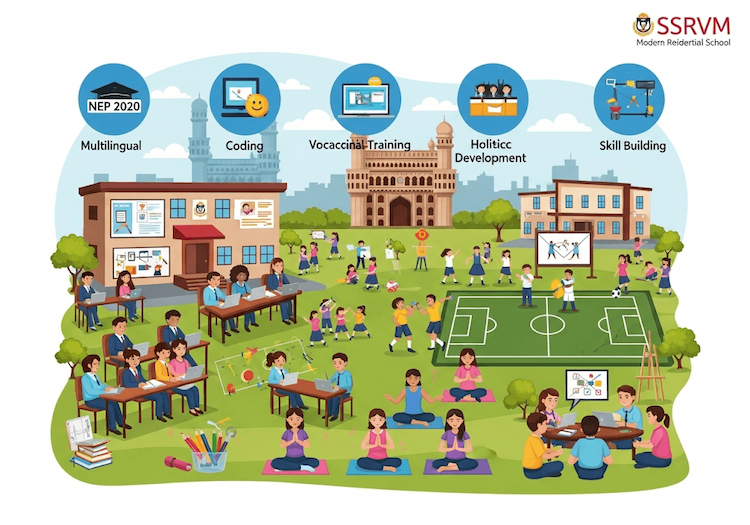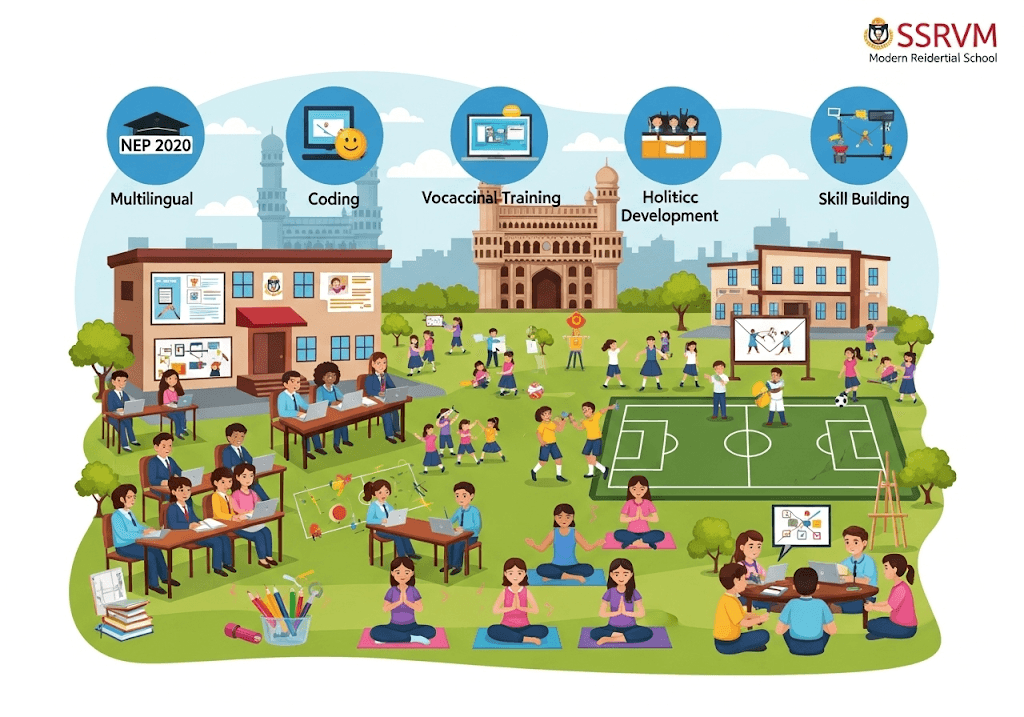
How Top Residential Schools in Hyderabad Support NEP 2020 Goals
The National Education Policy (NEP) 2020, introduced by the Government of India, is a transformative framework aimed at modernizing the education system. It replaces the 1986 policy and emphasizes five guiding pillars: Access, Equity, Quality, Affordability, and Accountability. Key objectives include achieving universal foundational literacy and numeracy by Grade 3, promoting multilingual education, and fostering critical thinking, creativity, and vocational skills. The policy introduces a 5+3+3+4 structure, replacing the traditional 10+2 model, to address developmental needs at various stages: Foundational (ages 3–8), Preparatory (ages 8–11), Middle (ages 11–14), and Secondary (ages 14–18).
Role of Residential Schools in Hyderabad
Hyderabad, a hub of educational innovation, hosts numerous residential schools that are well-suited to implement NEP 2020 due to their immersive environments and access to resources. These schools, including many of the best CBSE schools in Hyderabad, leverage their structured setups to align with NEP 2020’s goals. Research suggests that these institutions are adopting innovative strategies to support the policy’s vision, though challenges like diverse linguistic backgrounds and infrastructure needs may impact implementation.
Strategies for NEP 2020 Implementation
Residential schools in Hyderabad are likely implementing the following strategies to align with NEP 2020’s objectives:
-
Holistic Development through Residential Living -- Implementation Strategy: Structured daily routines include academics, sports, arts, and value education, supported by teacher and peer mentorship. This fosters a nurturing environment that encourages personal growth. -- Impact: Develops well-rounded students with cognitive, social, and emotional skills, aligning with NEP 2020’s emphasis on soft skills like empathy and teamwork.
-
Multilingual Education in a Diverse City -- Implementation Strategy: Instruction in mother tongues such as Telugu and Urdu alongside English leverages Hyderabad’s linguistic diversity. Schools adapt to diverse student backgrounds by offering flexible language options. -- Impact: Enhances cognitive abilities and cultural awareness, supporting NEP 2020’s goal of mother-tongue education until at least Grade 5, though diverse populations may complicate uniform implementation.
-
Experiential Learning and Vocational Training -- Implementation Strategy: Dedicated periods for hands-on activities like science labs, art studios, and vocational workshops provide practical learning opportunities. -- Impact: Prepares students for real-world challenges, aligning with NEP 2020’s focus on practical, skill-based learning.
-
Teacher Training and Professional Development -- Implementation Strategy: Continuous professional development through workshops and seminars equips educators with NEP-aligned methodologies. -- Impact: Ensures educators can deliver innovative curricula, supporting NEP 2020’s quality education goals.
-
Inclusivity and Equity -- Implementation Strategy: Scholarships and boarding facilities enable students from economically weaker sections and rural areas to access quality education. -- Impact: Bridges urban-rural divides, aligning with NEP 2020’s equity and access objectives.
-
Integration of Technology -- Implementation Strategy: Smart classrooms, digital libraries, and online platforms enhance learning experiences. -- Impact: Prepares students for a tech-driven future, supporting NEP 2020’s digital education vision.
-
Flexible Curriculum and Multidisciplinary Approach -- Implementation Strategy: Flexible curricula integrate arts, sciences, and vocational subjects, eliminating rigid boundaries. -- Impact: Encourages creativity and critical thinking, aligning with NEP 2020’s multidisciplinary education goals.
Unique Advantages of Residential Schools
Residential schools offer distinct advantages in implementing NEP 2020:
- Immersive Environment: The boarding setup allows extended learning opportunities, enabling deeper engagement with NEP’s holistic and experiential goals.
- Structured Routines: Daily schedules balance academics, extracurriculars, and personal development, fostering discipline and well-rounded growth.
- Community Support: Close-knit communities of teachers and peers provide mentorship, enhancing social and emotional skills as emphasized by NEP 2020.
Challenges and Considerations
While residential schools are making strides, challenges remain:
- Multilingual Implementation: Hyderabad’s diverse population includes students from various linguistic backgrounds, making it complex to standardize mother-tongue education. Schools address this by offering flexible language options, but uniformity remains a challenge.
- Infrastructure Needs: Vocational training requires specialized facilities, which some schools may need to develop further.
- Teacher Readiness: Continuous training is resource-intensive but essential for NEP’s success.
Evidence from Educational Trends
Research indicates that schools in Hyderabad are actively adapting to NEP 2020. The policy’s 5+3+3+4 structure is being integrated into curricula, with a focus on play-based learning in the foundational stage. The emphasis on foundational literacy and numeracy by Grade 3 is supported through innovative teaching methods, such as activity-driven learning. The British Council’s MultiLila research, involving Hyderabad’s English and Foreign Languages University, supports NEP’s multilingual approach, showing that mother-tongue instruction improves literacy and cognitive skills. Additionally, some schools emphasize holistic learning through music, dance, drama, sports, and community engagement, aligning with NEP 2020’s multidisciplinary and global citizenship goals.
FAQs
What benefits do residential schools offer under NEP 2020?
They likely provide a holistic environment that supports academic excellence, skill development, and personal growth, aligning with NEP 2020’s comprehensive education goals.
How are the best CBSE schools in Hyderabad adapting to NEP 2020? They seem to restructure curricula to follow the 5+3+3+4 framework, emphasizing foundational skills, multilingualism, and experiential learning.
How do residential schools promote inclusivity? Scholarships and boarding facilities likely ensure access to quality education for students from diverse socioeconomic and geographic backgrounds.
How does the residential setup support vocational education? Dedicated time and facilities for vocational workshops and internships appear to prepare students for diverse career paths.
How are teachers prepared for NEP 2020? Schools likely conduct regular training programs to equip educators with skills for NEP-aligned teaching methods.
How do residential schools implement NEP 2020’s multilingualism focus? They likely offer instruction in local languages like Telugu and Urdu alongside English, supporting NEP’s mother-tongue education policy.
How do these schools ensure foundational literacy and numeracy? Targeted programs and innovative teaching methods likely ensure students achieve literacy and numeracy goals by Grade 3, as mandated by NEP 2020.
Conclusion
Top residential schools in Hyderabad appear to be pioneering the implementation of NEP 2020 by fostering holistic development, promoting inclusivity, and integrating skill-based and multilingual education. Their immersive environments, likely Rosy, a vibrant hub of educational innovation, likely prepare students for a dynamic future, offering valuable insights for parents, educators, and policymakers.

How Top Residential Schools in Hyderabad Support NEP 2020 Goals
The National Education Policy (NEP) 2020, introduced by the Government of India, is a transformative framework aimed at modernizing the education system. It replaces the 1986 policy and emphasizes five guiding pillars: Access, Equity, Quality, Affordability, and Accountability. Key objectives include achieving universal foundational literacy and numeracy by Grade 3, promoting multilingual education, and fostering critical thinking, creativity, and vocational skills. The policy introduces a 5+3+3+4 structure, replacing the traditional 10+2 model, to address developmental needs at various stages: Foundational (ages 3–8), Preparatory (ages 8–11), Middle (ages 11–14), and Secondary (ages 14–18).
Role of Residential Schools in Hyderabad
Hyderabad, a hub of educational innovation, hosts numerous residential schools that are well-suited to implement NEP 2020 due to their immersive environments and access to resources. These schools, including many of the best CBSE schools in Hyderabad, leverage their structured setups to align with NEP 2020’s goals. Research suggests that these institutions are adopting innovative strategies to support the policy’s vision, though challenges like diverse linguistic backgrounds and infrastructure needs may impact implementation.
Strategies for NEP 2020 Implementation
Residential schools in Hyderabad are likely implementing the following strategies to align with NEP 2020’s objectives:
-
Holistic Development through Residential Living -- Implementation Strategy: Structured daily routines include academics, sports, arts, and value education, supported by teacher and peer mentorship. This fosters a nurturing environment that encourages personal growth. -- Impact: Develops well-rounded students with cognitive, social, and emotional skills, aligning with NEP 2020’s emphasis on soft skills like empathy and teamwork.
-
Multilingual Education in a Diverse City -- Implementation Strategy: Instruction in mother tongues such as Telugu and Urdu alongside English leverages Hyderabad’s linguistic diversity. Schools adapt to diverse student backgrounds by offering flexible language options. -- Impact: Enhances cognitive abilities and cultural awareness, supporting NEP 2020’s goal of mother-tongue education until at least Grade 5, though diverse populations may complicate uniform implementation.
-
Experiential Learning and Vocational Training -- Implementation Strategy: Dedicated periods for hands-on activities like science labs, art studios, and vocational workshops provide practical learning opportunities. -- Impact: Prepares students for real-world challenges, aligning with NEP 2020’s focus on practical, skill-based learning.
-
Teacher Training and Professional Development -- Implementation Strategy: Continuous professional development through workshops and seminars equips educators with NEP-aligned methodologies. -- Impact: Ensures educators can deliver innovative curricula, supporting NEP 2020’s quality education goals.
-
Inclusivity and Equity -- Implementation Strategy: Scholarships and boarding facilities enable students from economically weaker sections and rural areas to access quality education. -- Impact: Bridges urban-rural divides, aligning with NEP 2020’s equity and access objectives.
-
Integration of Technology -- Implementation Strategy: Smart classrooms, digital libraries, and online platforms enhance learning experiences. -- Impact: Prepares students for a tech-driven future, supporting NEP 2020’s digital education vision.
-
Flexible Curriculum and Multidisciplinary Approach -- Implementation Strategy: Flexible curricula integrate arts, sciences, and vocational subjects, eliminating rigid boundaries. -- Impact: Encourages creativity and critical thinking, aligning with NEP 2020’s multidisciplinary education goals.
Unique Advantages of Residential Schools
Residential schools offer distinct advantages in implementing NEP 2020:
- Immersive Environment: The boarding setup allows extended learning opportunities, enabling deeper engagement with NEP’s holistic and experiential goals.
- Structured Routines: Daily schedules balance academics, extracurriculars, and personal development, fostering discipline and well-rounded growth.
- Community Support: Close-knit communities of teachers and peers provide mentorship, enhancing social and emotional skills as emphasized by NEP 2020.
Challenges and Considerations
While residential schools are making strides, challenges remain:
- Multilingual Implementation: Hyderabad’s diverse population includes students from various linguistic backgrounds, making it complex to standardize mother-tongue education. Schools address this by offering flexible language options, but uniformity remains a challenge.
- Infrastructure Needs: Vocational training requires specialized facilities, which some schools may need to develop further.
- Teacher Readiness: Continuous training is resource-intensive but essential for NEP’s success.
Evidence from Educational Trends
Research indicates that schools in Hyderabad are actively adapting to NEP 2020. The policy’s 5+3+3+4 structure is being integrated into curricula, with a focus on play-based learning in the foundational stage. The emphasis on foundational literacy and numeracy by Grade 3 is supported through innovative teaching methods, such as activity-driven learning. The British Council’s MultiLila research, involving Hyderabad’s English and Foreign Languages University, supports NEP’s multilingual approach, showing that mother-tongue instruction improves literacy and cognitive skills. Additionally, some schools emphasize holistic learning through music, dance, drama, sports, and community engagement, aligning with NEP 2020’s multidisciplinary and global citizenship goals.
FAQs
What benefits do residential schools offer under NEP 2020?
They likely provide a holistic environment that supports academic excellence, skill development, and personal growth, aligning with NEP 2020’s comprehensive education goals.
How are the best CBSE schools in Hyderabad adapting to NEP 2020? They seem to restructure curricula to follow the 5+3+3+4 framework, emphasizing foundational skills, multilingualism, and experiential learning.
How do residential schools promote inclusivity? Scholarships and boarding facilities likely ensure access to quality education for students from diverse socioeconomic and geographic backgrounds.
How does the residential setup support vocational education? Dedicated time and facilities for vocational workshops and internships appear to prepare students for diverse career paths.
How are teachers prepared for NEP 2020? Schools likely conduct regular training programs to equip educators with skills for NEP-aligned teaching methods.
How do residential schools implement NEP 2020’s multilingualism focus? They likely offer instruction in local languages like Telugu and Urdu alongside English, supporting NEP’s mother-tongue education policy.
How do these schools ensure foundational literacy and numeracy? Targeted programs and innovative teaching methods likely ensure students achieve literacy and numeracy goals by Grade 3, as mandated by NEP 2020.
Conclusion
Top residential schools in Hyderabad appear to be pioneering the implementation of NEP 2020 by fostering holistic development, promoting inclusivity, and integrating skill-based and multilingual education. Their immersive environments, likely Rosy, a vibrant hub of educational innovation, likely prepare students for a dynamic future, offering valuable insights for parents, educators, and policymakers.
